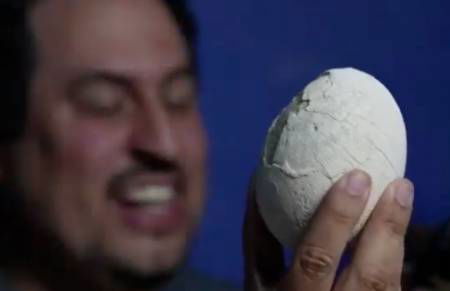The discovery has left scientists in awe — and they’ve explained why it’s considered one of the rarest and most extraordinary finds in modern paleontology.
Researchers in Argentina have unearthed a perfectly preserved dinosaur egg, leaving both scientists and the internet astonished. The fossilized egg, estimated to be more than 70 million years old, was discovered on October 7 by a team of Argentine paleontologists who were stunned by its nearly flawless condition.
The egg was found near the Rio Negro in General Roca, Patagonia, during an expedition led by the Museum of Natural Sciences of Argentina. During a livestream announcement, the researchers couldn’t hide their excitement, celebrating what they called a once-in-a-lifetime discovery.
As the team proudly held the egg up to the camera, the room erupted in cheers and applause. One scientist exclaimed: “It was so well preserved that it looked recent.”
Another added: “We’ve never seen anything like it, we’ve never seen an egg so well preserved.”

Aside from faint markings on its oval surface, the egg appeared astonishingly intact — making it one of the most remarkable fossil discoveries in recent years.
The finding was part of Cretaceous Expedition I, a research mission organized by Argentina’s National Council for Scientific and Technical Research (CONICET).
After the news broke, the internet quickly lit up with excitement. Social media users flooded platforms like X (formerly Twitter) with memes and comparisons to Jurassic Park.
One person wrote: “DINO NEWS FLASH! whole dinosaur egg found. We’re one step closer to getting an actual real Jurassic Park?!”
Another jokingly suggested that the Rio Negro river should now be renamed “Jurassic Park River.”
Experts believe the egg most likely belonged to a bonapartenykus, a genus of long-legged, bipedal carnivorous dinosaurs that lived in Patagonia during the Late Cretaceous period. Fossils of other reptiles and ancient mammals were also discovered nearby, suggesting the site may have once been a massive nesting ground millions of years ago.
Speaking to National Geographic, researcher Gonzalo Muñoz described the moment of discovery:
“It was a complete and utter surprise. It’s not common to find the egg of a possible carnivorous dinosaur, much less in that state.”
He continued, “The happiness was spectacular for the team.”
Muñoz explained that such finds are exceptionally rare because the eggs of carnivorous dinosaurs are fragile, with thinner shells that often don’t survive long enough to fossilize.
“They’re much more delicate eggs,” he noted, “with thinner shells that are more likely to be destroyed.”
When asked if this could bring humanity closer to a real-life Jurassic Park, scientists were cautious but intrigued. The team plans to scan the egg to determine whether any embryonic material remains inside.
Muñoz explained: “An embryo is a very delicate animal, and its preservation is more complex. Although the egg was preserved complete, we don’t know if the embryo was there and died, or if it was an egg that didn’t have an embryo.”
If embryonic remains are discovered, it could mark one of the most groundbreaking paleontological discoveries in decades, offering new insight into how carnivorous dinosaurs developed and evolved.
Once all testing is complete, the egg will be carefully preserved and displayed at a museum in Patagonia, allowing visitors to witness the extraordinary 70-million-year-old relic up close.
